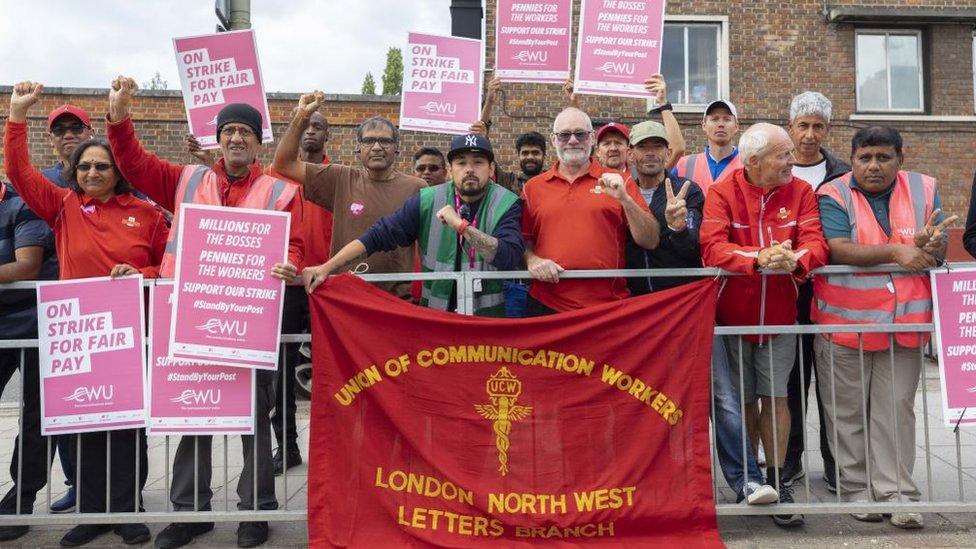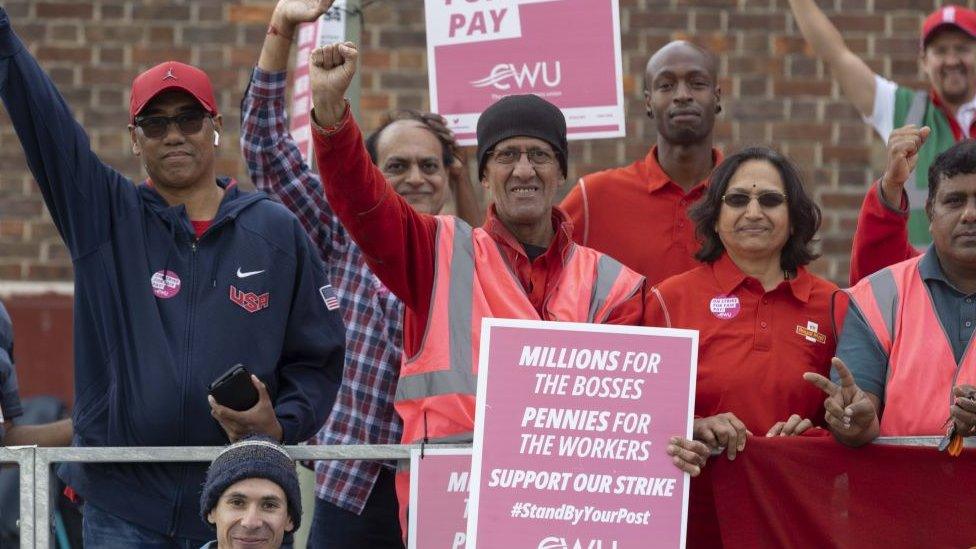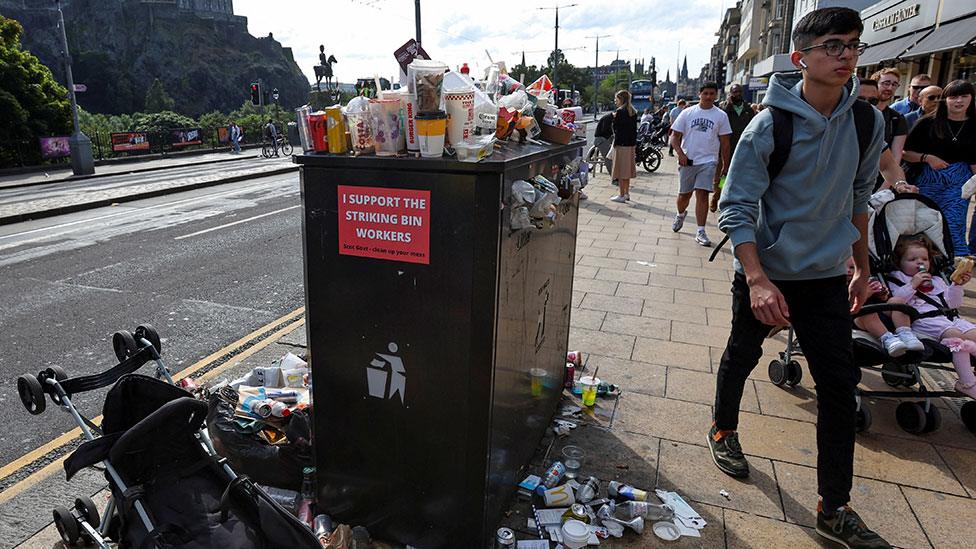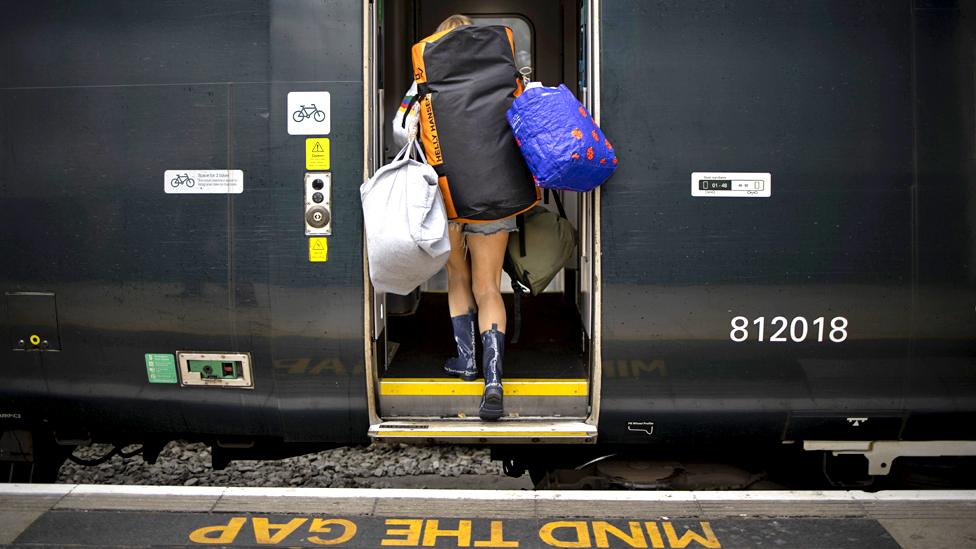Royal Mail and BT strikes see 150,000 workers walk out
- Published
- comments

Thousands of postal workers have walked out in a second day of action, joining telecoms workers, who are are also out on strike, as unions push for higher wage rises for their members.
On Wednesday 115,000 Royal Mail workers were on strike while 40,000 BT and Openreach workers stayed out, in action that began on Tuesday.
The postal worker strikes will disrupt delivery of packages and letters.
Royal Mail staff are planning further strikes on 8 and 9 September.
Members of the Communication Workers Union (CWU) at the Royal Mail said they were striking after rejecting a pay rise of 2%, and called on Royal Mail to offer an increase that "covers the current cost of living".
The median pay at Royal Mail is £32,465 a year, with the average pay for a postal delivery worker lower than that at £25,777.
The Royal Mail said their pay offer had included further pay-rises on condition that workers agreed to modernising reforms, and that the strikes could damage the firm.
"The CWU's self-centred actions with the wider trade union movement is putting jobs at risk, and making pay rises less affordable... making Royal Mail's future more uncertain than at any time in its long history," a Royal Mail spokesperson said.
CWU staff at BT Group are also striking against pay deals that do not keep pace with inflation. Prices in the UK are rising at their fastest for 40 years, with inflation currently at 10.1%.
"The reason for the strike is simple: workers will not accept a massive deterioration in their living standards," said CWU general secretary Dave Ward.
The postal strikes are affecting the delivery of post, including premium paid services like Royal Mail Special Delivery, which guarantees arrival by 13:00 the next day. Royal Mail said it was not able to provide any compensation for items that are late as a result of industrial action.

Royal Mail's latest adjusted operating profit for the year to March was £416m, up from £344m previously.
But Royal Mail's chief executive Simon Thompson told the BBC that despite an increase in business during the pandemic, the company was now losing £1m a day.
"Our reality is that the Covid bubble has burst, and we can see the economic situation around us all," he said.
The businesses needed to pivot from a focus on delivering letters into a business focused on the parcels market, he said.
Royal Mail said it has offered workers a 5.5% pay deal, comprising 2%, paid in June and backdated to April 2022, with a further 1.5% to be paid from the date upon which reforms are implemented. Royal Mail said it wanted to discuss varying working hours and days with the union. A further 2% of salary would be available in a productivity bonus, the firm said.
The CWU said the additional 1.5% was "strictly conditional on postal workers agreeing changes which would rip up their terms and conditions".
Widespread action
The UK has been hit by a wave of industrial action this summer, reflecting worker dissatisfaction at pay rises that are failing to keep up with rising inflation.
The trade union Aslef has also announced a strike by train drivers at 12 train companies, on Thursday 15th September over pay. It would be the largest walkout yet by train drivers.
Around 5,000 members of the TSSA union that represents transport staff, have said they will strike on 26 and 27 September in an ongoing dispute over their pay and conditions.
They work for nine train companies - including TransPennine Express and West Midlands Trains, who voted for strike action last week - and for Network Rail.
Refuse workers and rail workers have walked out, and NHS workers and teachers are also discussing strike action this autumn in protest over salary offers.
Dave Penman, general secretary of the FDA union, has also said that civil servants are skipping meals. He told Times Radio that they are "terrified" of being deployed to jobs in London because their salaries are not keeping pace with inflation.
Unite and Unison, the UK's largest unions have said they will seek to co-ordinate strike action this autumn to try to secure better pay deals.
- Published1 August 2023

- Published16 November 2022

- Published29 August 2022

- Published18 August 2022

- Published24 June 2022
